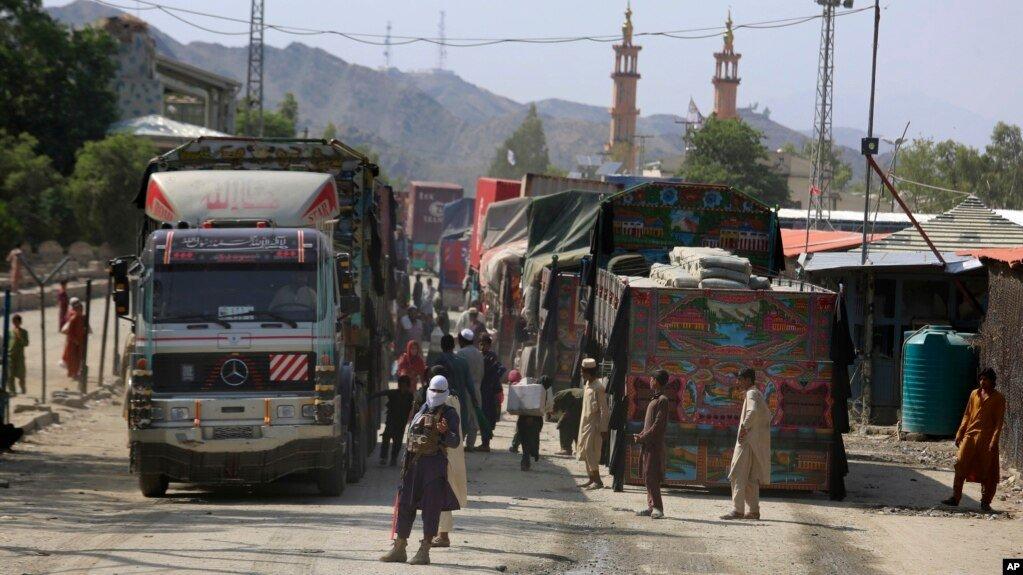KABUL (Pajhwok): With talks between Afghanistan and Pakistan on barter trade underway for quite some time, economists hold mixed views regarding the protection of Kabul’s interest under the proposed deal.
The Afghanistan Chamber of Commerce and Investment (ACCI) says this agreement, as and when signed, will initially involve trade in 20 times. In case of success, the number of items will surge.
“Almost 80 percent progress has been achieved on the agreement. The Hawala – cash transfer — system would be continued, items exchanged and individuals involved in exports and imports would be able to deposit afghanis in Kabul and rupees in Pakistan,” said Khan Jan Alkozai, deputy head of ACCI.
He added commerce chambers from both sides strived to share the problems faced by the private sector with the leadership of both countries.
Pakistan’s central bank had lately intensified the scrutiny of trade money under pressure from the international community and that had led to more problems, he claimed.
As a result of efforts by both chambers, the State Bank of Pakistan cancelled E-Form and EIF. Governments on both sides are striving to develop a mechanism for barter trade to resolve these problems.
Led by the two chambers, committees have been tasked with devising a strategy for barter trade.
Earlier, the Afghanistan Banks Union said most banks in the country did not face any problems in transferring money abroad. However, money transfer is not taking place for decorative items.
Alkozai continued consultations on barter trade were being concluded with Afghanistan. Pakistan’s private sector and the relevant committee are functioning under the leadership of the Ministry of Commerce and Industries. Stakeholders and the public could share their proposals with them.
He explained the two sides had not yet reached any agreement on barter traded. When both committees reach a final agreement, the pact would be finalised and approved by the governments.
Against Afghanistan’s interest
University teacher Zakria Haidari called barter an exchange of goods and services between two or more parties without the use of money. He said this method was used decades ago, but currently it was not in practice.
“Afghanistan is a country with over 50 percent of trade deficit, meaning that we lack export items and are heavily dependent on imports,” he commented.
The teacher said Pakistan enjoyed an upper hand economically over Afghanistan. If a barter trade agreement is signed, Islamabad will reap more benefits.
He feared Afghanistan could lose its economic partners and there would be curbs on the flow of trade. Afghanistan could become reliant on a single country.
If interests of both countries were equally served, he said, the agreement could mutually beneficial. If this model had been effective, he argued, other countries would have used it.
Another expert, Syed Massoud, wrote on his Facebook page that barter trade with a small or a huge volume would benefit a stronger and larger economy. In this case, he predicted, Pakistan would be the beneficiary.
He alleged Pakistan wanted to exchange its cheapest items for valuable Afghan items. Islamabad’s target was Afghanistan’s natural resources, he insisted.
“In the protocol, it could be written that the currency could be the afghani or the rupee. In this case, the Pakistani rupee would replace the dollar and thus deal a blow to the afghani — something which is happening for the first time,” he argued.
Massoud warned: “As a result of barter trade, Afghanistan’s markets will be monopolised by Pakistan. Afghan manufacturers will act according to the wishes of Pakistani investors.
“Economic incentives in Afghanistan’s businesses would decline rapidly. Afghan traders will be ousted from the markets of other countries. Pakistani entrepreneurs and banks will find their place in Afghan trade and get a chance of interaction with other nations.”
He cautioned: “Foreign currency reserves will fall by as much as $1 billion and the value of the afghani decline. The Pakistani rupee will replace the national currency in domestic exchanges.”
He asked the government to avoid entering a barter trade pact with Pakistan.
Beneficial for Afghanistan: Experts
Syed Zaman Hashimi, former head of ACCI had said at a meeting in February 2020: “The government, in coordination with diplomatic channels in both countries, shall work effectively for a mutually beneficial barter trade mechanism. This can be more beneficial for the people of Afghanistan.”
Hashimi expressed this view in February 2020 at a virtual meeting organised by ACCI and the Afghanistan embassy in Australia.
Economist Saviz Savizyar said at the meeting that barter trade was a good option for some nations with rich natural reserves and Afghanistan was one of them.
He believed Afghanistan, by exercising this option, could conduct legal trade with China using a principled framework. This mechanism could provide more facilities for traders in addition to helping establish direct relations between them.
nh/mud








GET IN TOUCH
NEWSLETTER
SUGGEST A STORY
PAJHWOK MOBILE APP